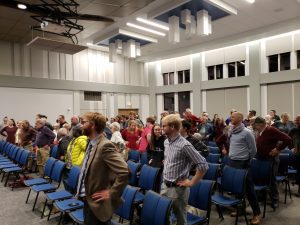Butler Seminar: Non-Theistic Perspectives on the Environment
On Tuesday, October 30th, we held the second session of the yearlong Butler Seminar on Religion and Global Affairs, whose topic this year is Sacred Places: Intersections of Religion and Ecology. The second session was entitled “Non-Theistic Perspectives on the Environment: Buddhist and Jain Ecologies” and featured two eminent scholars of these traditions, Dr. Daniel Cozort of Dickinson College in Pennsylvania and Dr. Christopher Key Chapple of Loyola Marymount University in Los Angeles.
In the Abrahamic traditions of Judaism, Christianity, and Islam, theological thinking about environmental issues typically makes reference to God as Creator, which means that the Earth and all its creatures are inherently good and worth protecting because they are products of God’s creative intentions. However, Jainism and certain traditions within Buddhism, such as Zen and Theravada, are non-theistic, which means that there is no notion of a deity creating the universe. For Jains and for Buddhists, the universe is often conceived as eternal, so there is no need for it to be “created.” So how do these non-theistic traditions frame care for the environment?
As we heard in the lectures, there are robust environmental ethics in both of these traditions, rooted in beliefs and practices specific to religious traditions with their origins in India. For example, Buddhism teaches that the root of human suffering is delusion and ignorance about reality and this is expressed in the “three marks of reality”: suffering, impermanence, and no-self. All of life is suffering and dissatisfaction, rooted in our ignorance of the way things really are. The way things really are is impermanent, in flux, and radically interconnected. But the deepest roots of our delusions stem from our tendency to think of ourselves as separate, independent, permanent selves, rather than as interconnected with all existence in fundamental ways. When we understand that we are not independent beings but “interbeings” and when we understand that everything exists in interdependence on everything else, we can alleviate suffering and focus our energies on loving and caring for all beings.
The Vietnamese Zen master Thich Nhat Hanh asks us to imagine a simple piece of paper to understand “interbeing.” We tend to think that this piece of paper has an independent existence, but when we think more deeply we realize that this paper couldn’t exist without the trees, and the trees couldn’t exist without rain and sunshine and nutrients in the soil, and the tree couldn’t be turned into paper without loggers and paper mill workers and salespeople, and none of those people could exist without food and drink and shelter and parents, and so on and so forth. When we really see the paper, it turns out that we’re holding the entire universe in our hands! So to care for one part of the earth is to care for everything in it, ourselves included.

Jainism also offers a robust environmental ethic based on its central teaching of ahimsa, or non-harm. Jainism, like Zen and Theravada Buddhism, does not profess belief in a deity. Jains believe that everything that exists is composed of both spirit and matter, or “life” and “non-life.” People, animals, rivers, mountains, rocks, tables, chairs: all contain both life and non-life. All things are capable of suffering, so Jains believe that everything that exists must be treated with care and respect. Jain monks and nuns go barefoot to remember their connection to the Earth and to step lightly on it, minimizing the harm they might do to any living thing. Some monks and nuns will sweep the ground before they take a step and wear a mask to avoid breathing in or drinking another living thing. Jains are typically vegetarians and also avoid eating root vegetables such as carrots, potatoes, or onions, because eating these vegetables requires killing the plant. Jains are also likely to work in fields such as medicine and education: areas that promote life and wellbeing. Jains also take five vows, including non-harm, telling the truth, only taking what is freely given, chastity, and not possessing more than is needed. It is perhaps obvious how these vows contribute to a vibrant environmental ethic, as Jains pay careful attention to their impact on all beings. The environment must be protected and cared for because the environment is full of beings capable of suffering, so we must always take care that our actions do no harm.
Buddhism and Jainism are ancient traditions with many valuable insights to offer us as we confront serious environmental crises of our own making. To understand nature as alive and as capable of suffering and to understand our interconnection with all things should inspire compassion and mindfulness of the way we walk upon the earth.
Brent Hege
CFV Scholar in Residence and Lecturer in Religion
9 thoughts on “Butler Seminar: Non-Theistic Perspectives on the Environment”
555
I gave organic cbd cream a try for the treatment of the primary adjust, and I’m amazed! They tasted great and provided a intelligibility of calmness and relaxation. My emphasis melted away, and I slept outstrip too. These gummies are a game-changer an eye to me, and I highly commend them to anyone seeking natural pain relief and well-advised sleep.
Получить кредит вебмани online.
jeremy hill https://dataput.ru carpet cleaning in colorado springs
how to create a financial plan https://zakazat-poppers.blogspot.com advance door company
domain name offers https://vvq.blogmee.ru uv digital printer
мгновенный кредит webmoney
Где получить займ вебмани быстро?
как в старом фильме про любовь. Моментальный займ вебмани. cмотреть видео как вор играет на гитаре